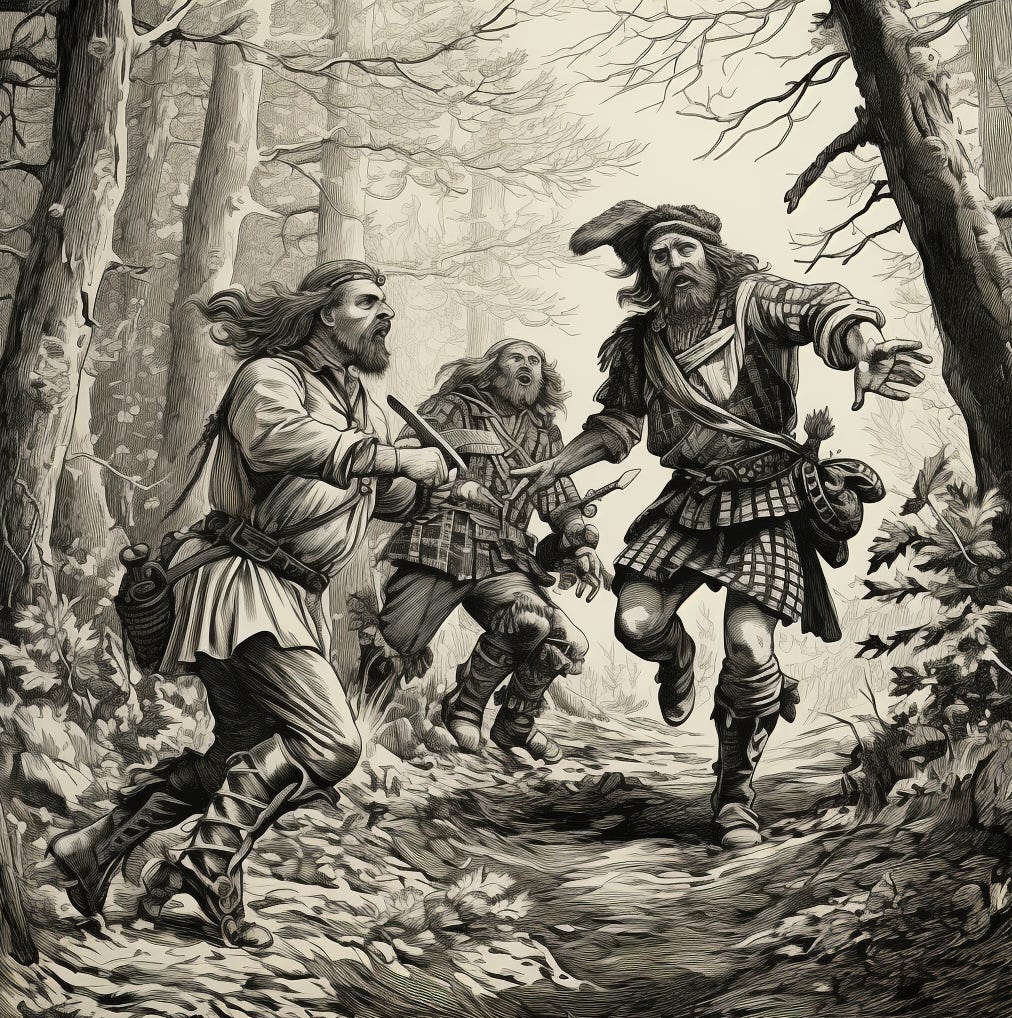Lachlan Beg's Betrayal: Unveiling Clan Chattan's Dark Tale
In the rugged and tumultuous Scottish Highlands of the 16th century, a period rife with clan rivalries, political maneuvering, and shifting allegiances, a tragic event occurred that would forever mark the history of Clan Mackintosh and Clan Chattan. It was the year 1524, a time when the Highlands were a landscape of both breathtaking natural beauty and unforgiving conflicts. In the heart of this setting, in the region of Badenoch, the life of Lachlan Beg Mackintosh, the 14th chief of Clan Mackintosh and Clan Chattan, came to a sudden and violent end.
Setting the Stage: Highlands, Badenoch, and 16th Century
The year 1524 witnessed the unfolding of a dramatic episode in the Scottish Highlands, a region renowned for its breathtaking landscapes and rich history. Nestled within this rugged terrain was the district of Badenoch, where Lachlan Beg Mackintosh held sway as the 14th chief of Clan Mackintosh and the head of the Clan Chattan confederation. The early 16th century was a time of intricate clan politics, power struggles, and alliances, and it was against this backdrop that the events leading to Lachlan's tragic end unfolded.
The Treacherous Plot: Murder Most Foul
The details surrounding Lachlan Beg Mackintosh's murder are a chilling tale of betrayal and deceit. Lachlan's own clansman, John Malcolmson, who was the natural son of Lachlan's deceased half-brother, perpetrated the treacherous act. Lachlan's generosity and kindness towards John had been evident through various acts, including granting him occupation of Connage in Petty and arranging his marriage. However, beneath this facade of amity lay deep-seated ambition and a thirst for power.
On that fateful day in March 1524, as Lachlan was hunting at Ravoch in Badenoch, he was ambushed and murdered by John Malcolmson along with two Davidson accomplices. This act of violence shattered the delicate balance within the clan and plunged the region into turmoil. John Malcolmson's motives were rooted in his ambition to attain control over the clan and assert his dominance. The very man who had once received kindness from Lachlan turned against him in the pursuit of power and control.
The Aftermath: Pursuit of Justice and Retribution
Upon committing the heinous crime, the murderers sought refuge in the fort at Loch-an-Eilan (Rothiemurchus). However, their sanctuary was short-lived, as Lachlan's natural son, Donald Glas, along with Donald MacWilliam and the chief of Clan Gregor, rallied to seek justice for the slain chief. A rigorous pursuit ensued, resulting in the capture of John Malcolmson and his accomplices. The wheels of justice turned swiftly, and the murderers faced trial.
The Earl of Moray presided over the trial, and the verdict was damning. John Malcolmson was found guilty and condemned to face a gruesome end—beheading and quartering. His two Davidson accomplices suffered the same fate, their lives ending in the aftermath of their treacherous act. The swift retribution was a testament to the severity of the crime and the determination to uphold justice, even in the midst of a complex and volatile Highland landscape.
Legacy and Reflection: Lachlan Beg Mackintosh's Enduring Impact
Lachlan Beg Mackintosh's tragic demise left a profound mark on the annals of Scottish history and the legacy of Clan Mackintosh. His fate stands as a reminder of the intricate web of relationships, ambitions, and power dynamics that characterized the Highland clans during the 16th century. The story of his murder reflects the delicate balance between loyalty and betrayal, kindness and ambition, which shaped the destinies of clans and individuals alike.
The events surrounding Lachlan's death highlight the fragility of trust within the clan structure, where personal ambitions could override even the strongest bonds of kinship. The aftermath of his murder revealed the unwavering commitment of the Highland clans to uphold justice and seek retribution for acts of violence and treachery, even when it meant turning against one of their own.
In conclusion, the murder of Lachlan Beg Mackintosh serves as a poignant reminder of the complexities of life in the Scottish Highlands during the 16th century. The clash of personal aspirations, the thirst for power, and the pursuit of justice all played a role in shaping the course of events that led to his tragic end. Lachlan's story is a testament to the intricate interplay of loyalty and betrayal that defined the lives of Highland clansmen, leaving a lasting impact on the history and memory of the Scottish Highlands.





